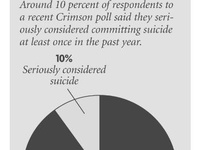She says if administrators had not helped her remain in school she would have had nowhere to go. Her parents are divorced and the parent she is closest with lives in a car, she says.
Waller says her freshman dean and senior tutor advocated strongly for her before the Ad Board and spoke to professors on her behalf to ensure that she could stay.
Kadison says he often speaks on behalf of students in therapy at UHS when they are called before the Ad Board, if they give him permission to do so.
Chief of MIT Medical’s Mental Health Service Alan E. Siegel says that MIT does not believe in encouraging mentally ill students to recuperate away from campus.
He says MIT administrators go to lengths to try to help students who want to continue their studies to stay on campus.
“It’s been my experience that MIT as an institution will really extend itself to try and help students remain on campus and live their lives as students participating in the university,” says Siegel. “People don’t have to be perfect they just have to be safe. The university will try to make it possible in whatever we do to help a student stay and be productive.”
But while Harvard students say that the College too often relies on leave of absence as a cure-all for mental health problems, administrators say more students should take this option.
Kadison says more students with mental health problems would benefit from taking time off.
“I think it’s not done often enough,” Kadison says. “There’s no shame to leave and come back in a much better frame of mind.”
University Provost Steven E. Hyman says students may be averse to taking time off because they consider it an admission of failure—and they should not.
“I think we all feel that if you take time off, it’s some terrifically negative mark on your record,” says Hyman, who is the former director of the National Institute of Mental Health. “If you had a dreadful physical illness and you were exhausted and couldn’t get out of bed, you would take time off. If you had an episode of mania, it might be really a good thing to take time off, re-collect yourself.”
Liability concerns
Some students who have dealt with severe mental illness at Harvard say the University is only acting in its one legal interest in promoting leaves of absence.
These students and legal and mental health experts suspect that the University is protecting its liability by attempting to push students with more serious mental health problems off campus.
Elizabeth A. Whitman ’05-’06, who has battled depression and an eating disorder, says that when she mentioned the possibility of taking time off, her senior tutor was eager to help her leave.
Read more in News
Chapel May Remain in Cambridge Permanently















